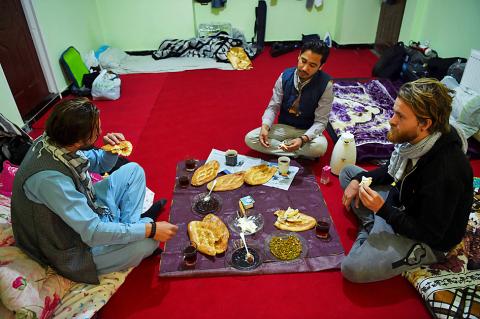Seeking an “authentic” experience as he backpacked through Afghanistan, Dutch tourist Ciaran Barr searched the Couchsurfing Web site for locals to stay with. He found an astonishing number of potential hosts.
Despite the nation’s decaying security, nearly 2,000 Afghans — the vast majority of them men — have signed up to host guests on the social networking platform, which connects travelers around the world with locals who are willing to put them up for free.
“You feel like you get a more authentic feel for the city so you don’t get trapped in tourist hot spots,” Barr, 24, told reporters in heavily militarized Kabul, where he spent several nights sleeping on a thin mattress on the floor of his Afghan host’s bedroom.

Photo: AFP
“Not that there are any in Afghanistan,” he added.
Once a popular stop on the well-worn hippie trail between Europe and South Asia in the 1970s, Afghanistan has seen the number of foreign travelers crossing its borders dwindle in the past four decades.
However, dozens still make the dangerous journey every year, ignoring clear warnings from their governments to stay away from a country that by some estimates is the world’s deadliest conflict zone.
Many take their chances by staying with Afghan strangers they find through the Couchsurfing network, rather than paying for a room in a hotel protected by armed guards and bulletproof doors.
“Staying with people and dressing to blend in a bit makes it possible to travel in Afghanistan with not too big of a risk,” said Barr, who — with his dark hair and beard, and dressed in the baggy shalwar kameez favored by most Afghan men — stands out less than most foreigners.
Couch surfing’s concept is like a modern-day version of Afghanistan’s tradition of hospitality, which obliges Afghans to provide food and shelter to strangers, but it is risky.
Couch surfers only have their host’s online profile and references to judge their character. In a country where kidnappings remain common and foreigners are highly prized targets, they have no way of knowing if their host is connected to criminals, who might see a chance to get rich by abducting them or giving them up to militants.
“You can end up with the Taliban,” a diplomat in Kabul said. “It’s naive and reckless.”
That is what happened to North American couple Caitlan Coleman and Joshua Boyle, who were kidnapped while backpacking in Afghanistan in 2012.
They were freed from the Taliban in 2017, along with their three children who were born in captivity.
However, Norwegian tourist Jorn Bjorn Augestad said that government warnings exaggerate the dangers.
“They are too careful. You have to be smart about a lot of things. Having contact with a local is the best way to stay safe,” said Augestad, who plans to visit every country in the world, including Syria, before his 30th birthday this year.
Barr and Augestad began their week-long Afghan odyssey in the northern city of Mazar-i-Sharif, famous for its ancient Blue Mosque and buzkashi, a savage version of polo played with a goat carcass.
After reaching Kabul, the deadliest place in Afghanistan for civilians, Barr and Augestad stayed with Couchsurfing host Naser Majidi, 27, who works as a technical adviser for a water utility company.
For Afghans, hosting a foreigner is a chance to travel vicariously, as more countries make it all but impossible for Afghan passport holders to obtain a visa.
“I can make it easier for them to see the beauty of this country,” said Majidi, who has hosted six guests since signing up on Couchsurfing in 2016. “It’s a good experience for me — I get more friends and I know the world better.”
However, his family worry that he is putting himself in danger.
“They have advised me many times that this is very risky for you and for them [guests],” Majidi said.
Elyas Yari, who became a host in 2017 despite the objections of loved ones, said he enjoys listening to his guests’ “experiences and their ideas.”
“It’s fun for me,” said Yari, 19, who has received visitors from Canada, Russia, Mexico and Taiwan.
Afghanistan is “not as dangerous as it looks,” he added.
Barr and Augestad are not oblivious to the potential pitfalls of traveling independently in Afghanistan.
“Things can go well nine out of 10 times,” Barr said. “It just takes that one time when things go wrong and so far nothing has gone wrong. We also have been lucky.”

With much pomp and circumstance, Cairo is today to inaugurate the long-awaited Grand Egyptian Museum (GEM), widely presented as the crowning jewel on authorities’ efforts to overhaul the country’s vital tourism industry. With a panoramic view of the Giza pyramids plateau, the museum houses thousands of artifacts spanning more than 5,000 years of Egyptian antiquity at a whopping cost of more than US$1 billion. More than two decades in the making, the ultra-modern museum anticipates 5 million visitors annually, with never-before-seen relics on display. In the run-up to the grand opening, Egyptian media and official statements have hailed the “historic moment,” describing the

SECRETIVE SECT: Tetsuya Yamagami was said to have held a grudge against the Unification Church for bankrupting his family after his mother donated about ¥100m The gunman accused of killing former Japanese prime minister Shinzo Abe yesterday pleaded guilty, three years after the assassination in broad daylight shocked the world. The slaying forced a reckoning in a nation with little experience of gun violence, and ignited scrutiny of alleged ties between prominent conservative lawmakers and a secretive sect, the Unification Church. “Everything is true,” Tetsuya Yamagami said at a court in the western city of Nara, admitting to murdering the nation’s longest-serving leader in July 2022. The 45-year-old was led into the room by four security officials. When the judge asked him to state his name, Yamagami, who

DEADLY PREDATORS: In New South Wales, smart drumlines — anchored buoys with baited hooks — send an alert when a shark bites, allowing the sharks to be tagged High above Sydney’s beaches, drones seek one of the world’s deadliest predators, scanning for the flick of a tail, the swish of a fin or a shadow slipping through the swell. Australia’s oceans are teeming with sharks, with great whites topping the list of species that might fatally chomp a human. Undeterred, Australians flock to the sea in huge numbers — with a survey last year showing that nearly two-thirds of the population made a total of 650 million coastal visits in a single year. Many beach lovers accept the risks. When a shark killed surfer Mercury Psillakis off a northern Sydney beach last

‘CHILD PORNOGRAPHY’: The doll on Shein’s Web site measure about 80cm in height, and it was holding a teddy bear in a photo published by a daily newspaper France’s anti-fraud unit on Saturday said it had reported Asian e-commerce giant Shein (希音) for selling what it described as “sex dolls with a childlike appearance.” The French Directorate General for Competition, Consumer Affairs and Fraud Control (DGCCRF) said in a statement that the “description and categorization” of the items on Shein’s Web site “make it difficult to doubt the child pornography nature of the content.” Shortly after the statement, Shein announced that the dolls in question had been withdrawn from its platform and that it had launched an internal inquiry. On its Web site, Le Parisien daily published a